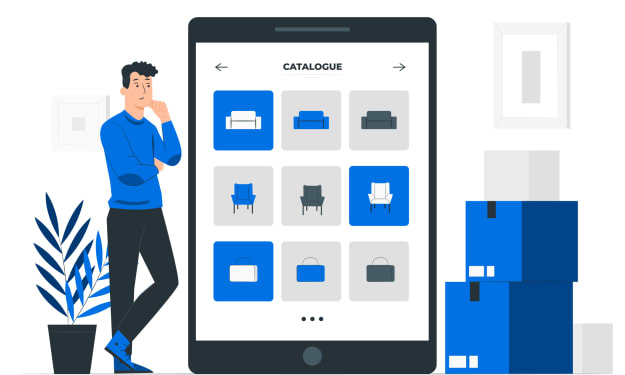Unlock the Power of Multiple Vendors with E-commerce Marketplace
Before embarking upon the topic–‘Unlock the power of multiple vendors with an ecommerce marketplace’ let's start with the basics first.

Of the many, the very first question which pops up in mind while talking about multiple vendors is–What is the difference between multiple vendors and single vendors? Though the name itself is self-explanatory as we said earlier that let's start from the basics so let's explore what single vendor means—Single vendor, in this situation, there is only one seller, who sells products directly to the customers.
In contrast to what single vendor means, the multi vendor meant more than one seller who sells their products, goods, or services to the customers.
However, in both situations what matters is where goods are being sold. Market experts say that in today’s context when consumer buying patterns have changed and they are expecting things at their own convenience, it will make difference only when the product is sold at the online ecommerce marketplace. Ecommerce marketplace refers to an online platform where multiple sellers can offer their products or services to customers. The marketplace operator acts as an intermediary between the buyers and sellers, providing a platform for transactions to occur. This allows sellers to reach a wider audience than they would be able to on their own, and it allows customers to compare and purchase products or services from multiple sellers in one place. These platforms typically provide tools and features for sellers to manage their products, orders, and payments, while also offering a seamless shopping experience for customers, with features such as search, reviews, and recommendations.
Ecommerce marketplaces have become increasingly popular in recent years, as they offer several advantages over traditional retail models. For sellers, they provide access to a large and diverse customer base, as well as the opportunity to expand their business without the high costs associated with opening physical stores. For customers, they offer convenience, choice, and competitive pricing, as well as access to products and services that may not be available locally.
Here are some advantages of Multi vendor ecommerce marketplace platform for both buyers and sellers:
Increased reach: Ecommerce marketplaces allow sellers to reach a larger audience than they would on their own. Buyers also have access to a wider range of products and services.
Reduced costs: Selling on an ecommerce marketplace can be more cost-effective than running a physical store, as no rent or maintenance costs are involved.
Convenience: Online marketplaces are available 24/7, allowing buyers to shop at their convenience. For sellers, it means they can make sales even when they are not physically present.
Trust: Established ecommerce marketplaces have built-in trust and credibility, which can help to attract buyers who may be wary of purchasing from unknown or unfamiliar sellers.
Data insights: Ecommerce marketplaces often provide sellers with access to data insights that can help them make more informed decisions about their inventory, pricing, and marketing strategies.
Brand exposure: Sellers can benefit from the brand exposure that comes with selling on a popular ecommerce marketplace. This can lead to increased brand awareness and customer loyalty over time.
In a nutshell, ecommerce marketplaces offer a range of benefits to both buyers and sellers, making them a popular choice for many businesses looking to expand their reach and increase their sales.
How does a multi vendor ecommerce platform function?
A multi-vendor ecommerce platform functions with the help of software that allows multiple sellers to list and sell their products on a single website. Here's how it typically works:
Registration: The sellers register on the platform and create a profile. They provide their details such as contact information, payment methods, shipping methods, etc.
Product listings: Sellers can list their products on the platform, including product descriptions, images, pricing, and other details. The listings are organized by categories and subcategories to make it easier for buyers to find what they are looking for.
Order management: When a customer places an order, the platform manages the entire order process, from payment processing to order fulfillment. The seller is notified of the order, and they can manage their inventory and delivery.
Commission and payment management: The platform charges a commission on each sale the seller makes, and the payment is usually processed through the platform. The platform may hold the payment until the order is fulfilled, after which it is released to the seller.
Customer support: The platform provides customer support to both buyers and sellers. With the availability of support options like live chat, both sellers and buyers can get assistance regarding any issue hampering smooth ordering and delivery.
The software used for a multi-vendor ecommerce platform typically includes features such as product management, order management, payment processing, and customer support. The platform may also include features such as analytics and reporting, marketing tools, and integrations with other software and services.
What are the features of the best multi vendor ecommerce marketplace software?
Multi-vendor ecommerce marketplace software comes with a range of features that help to manage multiple vendors and their products on a single platform. Here are some of the best features:
Vendor Management: The software should have a robust vendor management system that allows you to manage vendor profiles, product catalogs, inventory, order fulfillment, and payments.
Product Management: The software should allow vendors to manage their product listings easily. It should provide features like product catalog management, image uploading, pricing management, and product variations management.
Order Management: The software should provide tools for managing orders, such as order tracking, payment processing, and order fulfillment.
Commission Management: The software should have a commission management system that automates the calculation and payment of commissions to vendors. It should allow you to set commission rates for different vendors or products and track commissions paid.
Shipping Management: The software should allow vendors to manage their shipping deliveries and rates. Nowadays, software come up with the automation that assists in hassle-free delivery management.
Analytics and Reporting: The software should have a robust reporting system that allows you to track sales, vendor performance, and other key metrics. It should provide data visualization tools to help you make informed decisions.
Customization and Integration: The software should be customizable and allow you to add or remove features as per your business requirements. It should also be easily integrated with other software and services.
In totality, the best multi vendor ecommerce marketplace platform should provide a seamless experience for vendors and customers, streamline the management of multiple vendors, and provide robust analytics and reporting tools to help you make data-driven decisions.
Why is it high time to opt for a multi vendor ecommerce marketplace model?
The answer to this question lies with growth statistics of multi-vendor or hyperlocal delivery apps market revenue. As per the future market sights–the body that is expert in market survey and analysis, the delivery apps market revenue totalled US$952.7 million in 2021. And the apps market is expected to reach US$ 8,856.6 million by 2032, growing at a CAGR of 22.6% over the forecast period of 2022–2032.
Conclusion
So the takeaway is that adopting a multi vendor marketplace platform has become increasingly important for businesses looking to thrive in today's market. With the skyrocketing growth of ecommerce, more and more consumers are turning to online shopping, making it essential for businesses to have a strong online presence.
A multi vendor ecommerce marketplace platform offers several benefits to businesses, including increased customer traffic, greater product selection, and improved customer experience. By offering products from multiple vendors, businesses can attract a wider range of customers and offer a more diverse selection of products, leading to increased sales and revenue.
Moreover, a multi vendor ecommerce marketplace platform allows businesses to focus on their core competencies, while vendors handle the fulfillment of their products. This can lead to lower costs and improved operational efficiency, allowing businesses to focus on growth and expansion.
Overall, the explosive growth of ecommerce and the benefits of a multi vendor marketplace platform make it clear that adopting such a platform is essential for businesses looking to succeed in the modern market. By leveraging the power of a multi-vendor platform, businesses can stay ahead of the competition and continue to grow and thrive in the years to come.
About the Creator
Mohammad Rafe
A freelance Developer and Digital Branding Professional, on a mission to spread awareness on profits emerging from online business market.






Comments
There are no comments for this story
Be the first to respond and start the conversation.